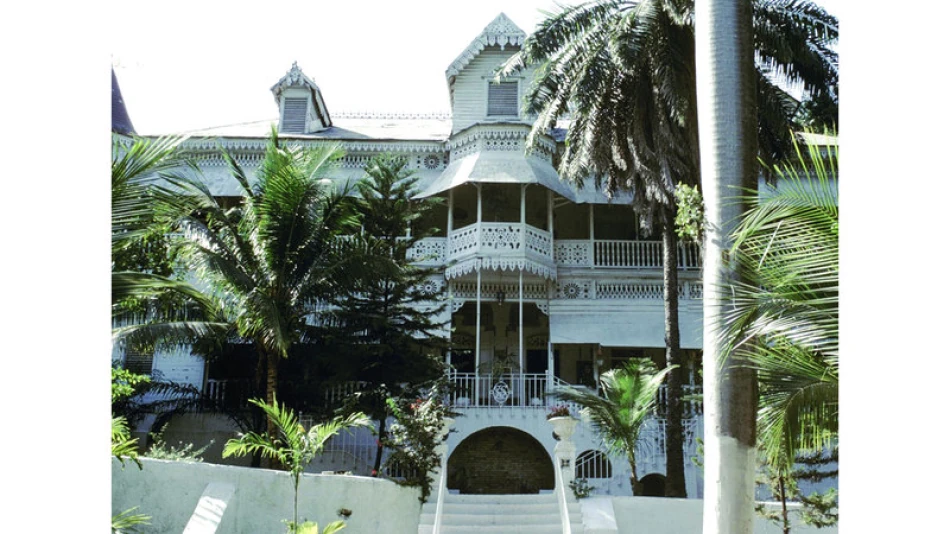
Devastating Fire Engulfs Haiti's Cultural Icon, Hotel Oloffson, Sparking National Mourning
Haiti's Cultural Soul Burns: Gang Violence Destroys Historic Oloffson Hotel in Capital's Descent Into Chaos
The destruction of Haiti's iconic Oloffson Hotel by fire on July 5th marks more than the loss of a building—it represents the systematic erasure of Haitian culture as armed gangs tighten their grip on Port-au-Prince. The 19th-century gingerbread palace, once host to Elizabeth Taylor and Graham Greene, has become a stark symbol of a nation approaching what UN officials warn is a "point of no return."
A Cultural Landmark Reduced to Ashes
The Oloffson Hotel, built in 1887 in the ornate "gingerbread" architectural style, served as Haiti's cultural crossroads for over a century. Its white wooden lacework balconies and Victorian flourishes made it a magnet for international celebrities, writers, and musicians from the 1960s through the 1980s.
The hotel's guest registry read like a who's who of global culture: actress Elizabeth Taylor, Rolling Stones frontman Mick Jagger, and British novelist Graham Greene, who immortalized the property in his 1966 novel "The Comedians." The building later became a hub for local voodoo musicians and foreign correspondents covering Haiti's tumultuous political landscape.
Haitian historian Georges Michel, who frequented the hotel, captured its significance: "It was a wonderful and distinctive place that transcended time and space. It was Haiti's symbol and like a home to me."
Architectural Heritage Under Siege
The Oloffson represented one of the finest examples of Haiti's gingerbread architecture—a style that flourished in Port-au-Prince during the late 19th century. These ornate wooden mansions, combining classical and neo-Gothic elements, were inspired by European architectural trends and often imported piece by piece from France.
Architect Daniel Elie noted that only dozens of these structures remain today, making the Oloffson's destruction particularly devastating. Unlike modern concrete buildings, these flexible wooden structures survived Haiti's catastrophic 2010 earthquake, only to fall victim to human violence.
Gang Control Reaches 90% of Capital
The hotel's burning occurred during a police operation in the area, with local media reporting it as retaliation by armed gangs. This incident reflects a broader pattern of territorial control that has transformed Port-au-Prince into a war zone.
UN officials now estimate that 90% of Haiti's capital is under gang control, with criminal organizations expanding beyond their traditional strongholds into previously peaceful neighborhoods. The "G9 alliance"—a coalition of criminal gangs—has systematically isolated the capital from the rest of the country since June 2021.
Political Vacuum Fuels Chaos
The assassination of President Jovenel Moïse in July 2021 created a political crisis that gangs have exploited ruthlessly. With no elected government in place, a transitional presidential council struggles to prepare elections while violence escalates daily.
The human cost is staggering: according to UN figures from January 2024, one million people have been displaced from their homes, while approximately 5,600 have been killed by gang violence. These numbers likely underestimate the true toll, as ongoing clashes make investigation dangerous for officials and journalists.
International Response Falls Short
Caribbean leaders have grown increasingly frustrated with the global community's inadequate response to Haiti's crisis. At the July CARICOM summit, Barbados Prime Minister Mia Mottley delivered a scathing assessment of international inaction.
"The world really needs to check itself with respect to Haiti," Mottley declared. "If we ever doubted that there are first-class citizens and second-class citizens in the world's view, there should be no doubt now."
Limited Regional Capacity
Caribbean nations lack the resources to address Haiti's escalating crisis alone. Despite massive loss of life, displacement, and food insecurity, international support remains limited to promises and empty rhetoric that cannot help Haiti's suffering population.
The deployment of a Kenyan-led international security mission has been delayed and underfunded, leaving Haitian police forces overwhelmed by well-armed criminal organizations that often outgun law enforcement.
Cultural Extinction in Real Time
The Oloffson's destruction represents what architect Elie called "successive losses" in Haitian culture that is "fading away." The hotel embodied Haiti's "indigenous movement" of 1915-1945, which sought to reclaim African heritage and elevate rural Haitian voices and traditions.
As gangs systematically destroy cultural institutions, universities, and historic buildings, they are erasing not just Haiti's past but its future. The closure of universities on the same street as the Oloffson and the flight of cultural workers represent an intellectual exodus that may take generations to reverse.
Economic Strangulation
Gang control of major trade routes has paralyzed legal commerce, causing sharp increases in prices for cooking fuel and rice—Haiti's staple food. This economic warfare creates a vicious cycle where desperate conditions fuel recruitment for criminal organizations.
The establishment of "parallel governance structures" by gangs fills the void left by absent or limited public services, creating a shadow state that may prove difficult to dismantle even if security improves.
Point of No Return
UN officials' warning about Haiti approaching a "point of no return" reflects more than hyperbole. The systematic destruction of cultural landmarks like the Oloffson, combined with mass displacement and institutional collapse, suggests a society in terminal decline.
While some dream of rebuilding the hotel when Port-au-Prince returns to an "acceptable state," such optimism appears increasingly detached from reality. The window for international intervention that could preserve Haiti's cultural heritage and democratic institutions is rapidly closing.
The burning of the Oloffson Hotel serves as both a literal and metaphorical funeral pyre for Haitian civilization—a warning that without immediate, substantial international action, one of the Western Hemisphere's most culturally rich nations may disappear entirely into the flames of gang violence and state collapse.
Most Viewed News

 Sara Khaled
Sara Khaled






